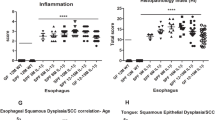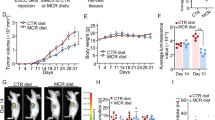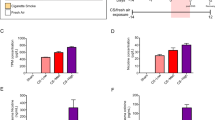Abstract
Chronic inflammation is implicated in the pathogenesis of esophageal squamous cell carcinoma (ESCC). The causes of inflammation in ESCC, however, are undefined. Dietary zinc (Zn)-deficiency (ZD) increases the risk of ESCC. We have previously shown that short-term ZD (6 weeks) in rats induces overexpression of the proinflammatory mediators S100a8 and S100a9 in the esophageal mucosa with accompanying esophageal epithelial hyperplasia. Here we report that prolonged ZD (21 weeks) in rats amplified this inflammation that when combined with non-carcinogenic low doses of the environmental carcinogen, N-nitrosomethylbenzylamine (NMBA) elicited a 66.7% (16/24) incidence of ESCC. With Zn-sufficiency, NMBA produced no cancers (0/21) (P<0.001). At tumor endpoint, the neoplastic ZD esophagus, as compared with Zn-sufficient esophagus, had an inflammatory gene signature with upregulation of numerous cancer-related inflammation genes (CXC and CC chemokines, chemokine receptors, cytokines and Cox-2) in addition to S100a8 and S100a9. This signature was already activated in the earlier dysplastic stage. Additionally, time-course bioinformatics analysis of expression profiles at tumor endpoint and before NMBA exposure revealed that this sustained inflammation was due to ZD rather than carcinogen exposure. Importantly, Zn replenishment reversed this inflammatory signature at both the dysplastic and neoplastic stages of ESCC development, and prevented cancer formation. Thus, the molecular definition of ZD-induced inflammation as a critical factor in ESCC development has important clinical implications with regard to development and prevention of this deadly disease.
This is a preview of subscription content, access via your institution
Access options
Subscribe to this journal
Receive 50 print issues and online access
$259.00 per year
only $5.18 per issue
Buy this article
- Purchase on Springer Link
- Instant access to full article PDF
Prices may be subject to local taxes which are calculated during checkout



Similar content being viewed by others
Accession codes
References
Ferlay J, Shin HR, Bray F, Forman D, Mathers C, Parkin DM . Estimates of worldwide burden of cancer in 2008: GLOBOCAN 2008. Int J Cancer 2010; 127: 2893–2917.
Balkwill F, Mantovani A . Inflammation and cancer: back to Virchow? Lancet 2001; 357: 539–545.
Coussens LM, Werb Z . Inflammation and cancer. Nature 2002; 420: 860–867.
Karin M . Nuclear factor-kappaB in cancer development and progression. Nature 2006; 441: 431–436.
Mandard AM, Hainaut P, Hollstein M . Genetic steps in the development of squamous cell carcinoma of the esophagus. Mutat Res 2000; 462: 335–342.
Magee PN . The experimental basis for the role of nitroso compounds in human cancer. Cancer Surv 1989; 8: 207–239.
Yang CS . Research on esophageal cancer in China: a review. Cancer Res 1980; 40 (8 Part 1): 2633–2644.
Abnet CC, Lai B, Qiao YL, Vogt S, Luo XM, Taylor PR et al. Zinc concentration in esophageal biopsy specimens measured by x-ray fluorescence and esophageal cancer risk. J Natl Cancer Inst 2005; 97: 301–306.
Kmet J, Mahboubi E . Esophageal cancer in the Caspian littoral of Iran: initial studies. Science 1972; 175: 846–853.
Poschl G, Seitz HK . Alcohol and cancer. Alcohol Alcohol 2004; 39: 155–165.
Ho E, Ames BN . Low intracellular zinc induces oxidative DNA damage, disrupts p53, NFkappa B, and AP1 DNA binding, and affects DNA repair in a rat glioma cell line. Proc Natl Acad Sci USA 2002; 99: 16770–16775.
Prasad AS, Kucuk O . Zinc in cancer prevention. Cancer Metastasis Rev 2002; 21: 291–295.
Vallee BL, Falchuk KH . The biochemical basis of zinc physiology. Physiol Rev 1993; 73: 79–118.
Rink L, Haase H . Zinc homeostasis and immunity. Trends Immunol 2007; 28: 1–4.
Berg JM, Shi Y . The galvanization of biology: a growing appreciation for the roles of zinc. Science 1996; 271: 1081–1085.
Stinson SF, Squire RA, Sporn MB . Pathology of esophageal neoplasms and associated proliferative lesions induced in rats by N-methyl-N-benzylnitrosamine. J Natl Cancer Inst 1978; 61: 1471–1475.
Stoner GD, Gupta A . Etiology and chemoprevention of esophageal squamous cell carcinoma. Carcinogenesis 2001; 22: 1737–1746.
Pegg AE . Methylation of the O6 position of guanine in DNA is the most likely initiating event in carcinogenesis by methylating agents. Cancer Invest 1984; 2: 223–231.
Lozano JC, Nakazawa H, Cros MP, Cabral R, Yamasaki H . G-->A mutations in p53 and Ha-ras genes in esophageal papillomas induced by N-nitrosomethylbenzylamine in two strains of rats. Mol Carcinog 1994; 9: 33–39.
Fong LY, Nguyen VT, Farber JL . Esophageal cancer prevention in zinc-deficient rats: rapid induction of apoptosis by replenishing zinc. J Natl Cancer Inst 2001; 93: 1525–1533.
Fong LY, Zhang L, Jiang Y, Farber JL . Dietary zinc modulation of COX-2 expression and lingual and esophageal carcinogenesis in rats. J Natl Cancer Inst 2005; 97: 40–50.
Taccioli C, Wan SG, Liu CG, Alder H, Volinia S, Farber JL et al. Zinc replenishment reverses overexpression of the proinflammatory mediator S100A8 and esophageal preneoplasia in the rat. Gastroenterology 2009; 136: 953–966.
Mantovani A, Allavena P, Sica A, Balkwill F . Cancer-related inflammation. Nature 2008; 454: 436–444.
Gebhardt C, Nemeth J, Angel P, Hess J . S100A8 and S100A9 in inflammation and cancer. Biochem Pharmacol 2006; 72: 1622–1631.
Balkwill F . Cancer and the chemokine network. Nat Rev Cancer 2004; 4: 540–550.
Williams CS, Mann M, DuBois RN . The role of cyclooxygenases in inflammation, cancer, and development. Oncogene 1999; 18: 7908–7916.
Voronov E, Shouval DS, Krelin Y, Cagnano E, Benharroch D, Iwakura Y et al. IL-1 is required for tumor invasiveness and angiogenesis. Proc Natl Acad Sci U S A 2003; 100: 2645–2650.
Karin M, Greten FR . NF-kappaB: linking inflammation and immunity to cancer development and progression. Nat Rev Immunol 2005; 5: 749–759.
Eltzschig HK, Carmeliet P . Hypoxia and inflammation. N Engl J Med 2011; 364: 656–665.
Cintorino M, Tripod SA, Santopietro R, Antonio P, Lutfi A, Chang F et al. Cytokeratin expression patterns as an indicator of tumour progression in oesophageal squamous cell carcinoma. Anticancer Res 2001; 21: 4195–4201.
Huang da W, Sherman BT, Lempicki RA . Systematic and integrative analysis of large gene lists using DAVID bioinformatics resources. Nat Protoc 2009; 4: 44–57.
Roussos ET, Condeelis JS, Patsialou A . Chemotaxis in cancer. Nat Rev Cancer 2011; 11: 573–587.
Samad TA, Moore KA, Sapirstein A, Billet S, Allchorne A, Poole S et al. Interleukin-1beta-mediated induction of Cox-2 in the CNS contributes to inflammatory pain hypersensitivity. Nature 2001; 410: 471–475.
Tu S, Bhagat G, Cui G, Takaishi S, Kurt-Jones EA, Rickman B et al. Overexpression of interleukin-1beta induces gastric inflammation and cancer and mobilizes myeloid-derived suppressor cells in mice. Cancer Cell 2008; 14: 408–419.
Wang B, Hendricks DT, Wamunyokoli F, Parker MI . A growth-related oncogene/CXC chemokine receptor 2 autocrine loop contributes to cellular proliferation in esophageal cancer. Cancer Res 2006; 66: 3071–3077.
Zimmermann KC, Sarbia M, Weber AA, Borchard F, Gabbert HE, Schror K . Cyclooxygenase-2 expression in human esophageal carcinoma. Cancer Res 1999; 59: 198–204.
Kaifi JT, Yekebas EF, Schurr P, Obonyo D, Wachowiak R, Busch P et al. Tumor-cell homing to lymph nodes and bone marrow and CXCR4 expression in esophageal cancer. J Natl Cancer Inst 2005; 97: 1840–1847.
Kumar A, Chatopadhyay T, Raziuddin M, Ralhan R . Discovery of deregulation of zinc homeostasis and its associated genes in esophageal squamous cell carcinoma using cDNA microarray. Int J Cancer 2007; 120: 230–242.
Allavena P, Germano G, Marchesi F, Mantovani A . Chemokines in cancer related inflammation. Exp Cell Res 2011; 317: 664–673.
Miyazaki H, Patel V, Wang H, Edmunds RK, Gutkind JS, Yeudall WA . Down-regulation of CXCL5 inhibits squamous carcinogenesis. Cancer Res 2006; 66: 4279–4284.
Richmond A . Nf-kappa B, chemokine gene transcription and tumour growth. Nat Rev Immunol 2002; 2: 664–674.
Yamamoto K, Kitayama W, Denda A, Morisaki A, Kuniyasu H, Inoue M et al. Suppressive effects of a selective cyclooxygenase-2 inhibitor, etodolac, on 4-nitroquinoline 1-oxide-induced rat tongue carcinogenesis. Exp Toxicol Pathol 2004; 56: 145–151.
Nemeth J, Stein I, Haag D, Riehl A, Longerich T, Horwitz E et al. S100A8 and S100A9 are novel nuclear factor kappa B target genes during malignant progression of murine and human liver carcinogenesis. Hepatology 2009; 50: 1251–1262.
Hiscott J, Marois J, Garoufalis J, D’Addario M, Roulston A, Kwan I et al. Characterization of a functional NF-kappa B site in the human interleukin 1 beta promoter: evidence for a positive autoregulatory loop. Mol Cell Biol 1993; 13: 6231–6240.
Sun J, Liu J, Pan X, Quimby D, Zanesi N, Druck T et al. Effect of zinc supplementation on N-nitrosomethylbenzylamine-induced forestomach tumor development and progression in tumor suppressor-deficient mouse strains. Carcinogenesis 2011; 32: 351–358.
Fong LY, Jiang Y, Rawahneh ML, Smalley KJ, Croce CM, Farber JL et al. Zinc supplementation suppresses 4-nitroquinoline 1-oxide-induced rat oral carcinogenesis. Carcinogenesis 2011; 32: 554–560.
Bolstad BM, Irizarry RA, Astrand M, Speed TP . A comparison of normalization methods for high density oligonucleotide array data based on variance and bias. Bioinformatics 2003; 19: 185–193.
Acknowledgements
We thank Dr Kay Huebner (The Ohio State University) for reading and critical discussion of the manuscript. We thank Shao-gui Wan's assistance with animal care and validation of the array data. The microarray data were submitted to ArrayExpress (Accession number: E-MTAB-428). This work was supported by NIH grants R01CA118560 (LYYF) and R01CA115965 (CMC).
Author information
Authors and Affiliations
Corresponding author
Ethics declarations
Competing interests
The authors declare no conflict of interest.
Additional information
Supplementary Information accompanies the paper on the Oncogene website
Rights and permissions
About this article
Cite this article
Taccioli, C., Chen, H., Jiang, Y. et al. Dietary zinc deficiency fuels esophageal cancer development by inducing a distinct inflammatory signature. Oncogene 31, 4550–4558 (2012). https://doi.org/10.1038/onc.2011.592
Received:
Revised:
Accepted:
Published:
Issue Date:
DOI: https://doi.org/10.1038/onc.2011.592
Keywords
This article is cited by
-
Global comparative transcriptomes uncover novel and population-specific gene expression in esophageal squamous cell carcinoma
Infectious Agents and Cancer (2023)
-
Zinc Deficiency as a General Feature of Cancer: a Review of the Literature
Biological Trace Element Research (2023)
-
Co-exposure to iron, copper, zinc, selenium and titanium is associated with the prevention of gastric precancerous lesions
BioMetals (2023)
-
Microarray Analysis of the Chemoprophylaxis Effect of Zinc Gluconate: Inspiring but Caution Required
Digestive Diseases and Sciences (2021)
-
Epigenetic Effects of Dietary Trace Elements
Current Pharmacology Reports (2017)



